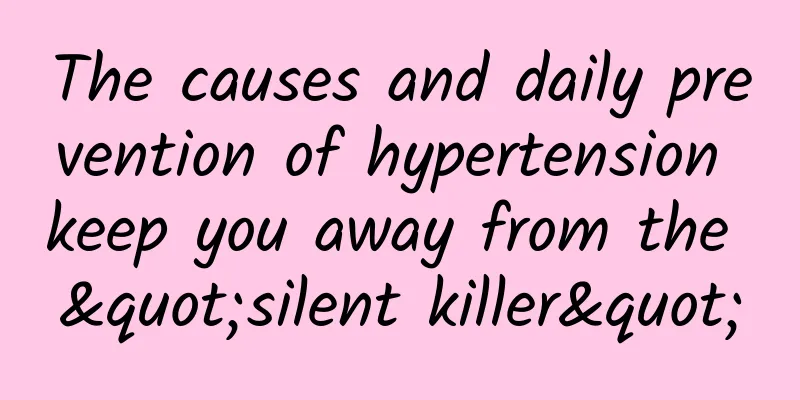The causes and daily prevention of hypertension keep you away from the "silent killer"

|
Did you know that high blood pressure is called the "silent killer"? It doesn't cause severe symptoms like a cold, but it threatens our health silently. So, what is high blood pressure? How can it be prevented? Let's uncover the causes of high blood pressure and the mysteries of daily prevention and treatment! 1. What are the dangers of “ silent ” hypertension? 1. Cardiovascular Hypertension increases the burden on the heart, leading to hypertrophy of the heart muscle and insufficient blood supply, which may eventually lead to heart failure. In addition, hypertension can damage vascular endothelial cells, increase the risk of arteriosclerosis and aneurysms, and increase the incidence of heart disease and stroke. 2. Brain Long-term high blood pressure can lead to arteriosclerosis, thrombosis or blood vessel rupture, causing cerebrovascular diseases such as ischemic stroke and hemorrhagic stroke. In addition, high blood pressure can damage brain blood vessels and increase the risk of neurodegenerative diseases such as Alzheimer's disease. 3. Kidney Hypertension can damage renal arterioles and glomeruli, leading to a decrease in glomerular filtration rate, which may eventually lead to chronic kidney disease and renal failure. In addition, hypertension can accelerate the development of renal arteriosclerosis and glomerulosclerosis, further aggravating kidney damage. 4. Eyes Hypertension can damage blood vessels in the eye, increase the risk of eye diseases such as glaucoma, retinal artery occlusion and retinal hemorrhage, and in severe cases may lead to blindness. Hypertension can also affect retinal blood flow and accelerate the progression of retinal arteriosclerosis and retinal vascular disease. 2. Causes of Hypertension 1. Genetic factors Hypertension clusters in families. If both parents have hypertension, the probability of their children suffering from the disease can be as high as 46%. About 60% of patients with hypertension have a family history. The inheritance pattern includes dominant inheritance of major genes and multi-gene association inheritance. In terms of genetic phenotype, not only the rate of blood pressure increase is hereditary, but also factors such as blood pressure level, occurrence of complications and obesity. There have been many studies on hypertension genes in recent years, but no breakthroughs have been made. Studies around the world have shown that about 30 chromosome segments may be related to hypertension. 2. Environmental factors Diet: Blood pressure levels and hypertension prevalence in different regions are related to sodium salt intake. The more salt you consume, the higher the rate of blood pressure increase, but in the same region, the correlation between individuals is uncertain, mainly in people who are sensitive to salt. Potassium intake is negatively correlated with blood pressure, and a low calcium diet is associated with the occurrence of hypertension. High protein intake, saturated fatty acids and excessive alcohol consumption can also lead to high blood pressure. Mental stress: The rate of hypertension among urban mental workers is higher than that among physical workers. People who have been engaged in mentally stressful work for a long time are more likely to suffer from hypertension. People who are in a noisy environment are more likely to suffer from hypertension. However, after resting, the symptoms of hypertension and blood pressure can be improved. 3. Other factors Obesity: Being overweight or obese is a major risk factor for high blood pressure. Obesity is closely related to the occurrence of hypertension, and BMI is positively correlated with blood pressure. People with abdominal obesity are more likely to suffer from hypertension. Contraceptive pills: Long-term use of oral contraceptives may cause high blood pressure, especially in women over 35. However, high blood pressure is usually reversible after stopping the pills. Sleep apnea-hypopnea syndrome (SAHS): recurrent episodes of apnea during sleep, 50% of which are accompanied by hypertension, which is associated with the course of SAHS. What are the drugs for treating hypertension? 1. Diuretics: Diuretics are one of the commonly used drugs for treating hypertension. They reduce water and salt in the body and blood volume by promoting urine excretion, thereby lowering blood pressure. Commonly used diuretics include thiazides, loop diuretics and spironolactone. 2. Angiotensin converting enzyme inhibitors: Angiotensin converting enzyme inhibitors (ACEI) inhibit angiotensin converting enzyme and block the synthesis of angiotensin II, thereby dilating blood vessels, reducing vascular resistance and lowering blood pressure. Commonly used ACEI drugs include benazepril, enalapril, etc. 3. Calcium ion antagonists: Calcium ion antagonists reduce vasoconstriction and lower blood pressure by blocking calcium ions from entering vascular smooth muscle cells. They can be divided into different types such as dihydropyridines, non-dihydropyridines and benzodiazepines. Commonly used calcium ion antagonists include amlodipine, nifedipine, flunidipine, etc. 4. Beta-blockers: Beta-blockers reduce heart rate and cardiac output by blocking beta receptors, reducing the stimulation of the heart on the renin-angiotensin-aldosterone system, thereby lowering blood pressure. Commonly used beta-blockers include metoprolol, atenolol, etc. 5. Alpha receptor blockers: Alpha receptor blockers reduce the excitability of the sympathetic nervous system and peripheral vascular resistance by blocking alpha receptors, thereby lowering blood pressure. Commonly used alpha receptor blockers include propranolol, iprecaine, etc. IV. How to prevent and treat hypertension in daily life 1. Maintain a healthy diet: Diet is an important part of hypertension management. Patients should choose a low-salt, low-fat, low-sugar diet and reduce the intake of high-cholesterol and high-calorie foods. Increasing the intake of fresh fruits, vegetables, whole grains, and low-fat proteins can help control blood pressure and improve overall health. In addition, limiting caffeine and alcohol consumption is also necessary as they may cause blood pressure to rise. 2. Weight control: By controlling weight, you can reduce the burden on your heart and vascular resistance, which helps lower your blood pressure. Patients can control their weight through reasonable diet control and moderate exercise, such as doing at least 150 minutes of moderate-intensity aerobic exercise per week. 3. Regular exercise: Aerobic exercise such as walking, running, swimming and cycling can enhance cardiovascular function and lower blood pressure. It also helps to control weight and reduce emotional factors such as anxiety and stress. It is recommended to exercise at least 3-5 times a week, each time lasting more than 30 minutes. 4. Control sodium intake in the diet: Excessive salt intake is one of the main factors leading to high blood pressure. Patients should limit the consumption of high-salt foods, minimize the amount of added salt, choose low-sodium foods, avoid excessive salt-cured products, canned foods, fast food and other high-salt foods, as well as excessive condiments such as soy sauce and MSG. 5. Maintain mental health: Psychological factors such as anxiety, tension and stress can also affect blood pressure. Hypertensive patients should learn to effectively deal with stress and keep a good mood. They can relieve stress and maintain a good mental state by resting, relaxing, doing yoga, meditating, etc. 6. Measure blood pressure regularly: Hypertensive patients should measure their blood pressure regularly to understand the changes in blood pressure in a timely manner and adjust it according to the doctor's advice. It is recommended that patients measure their blood pressure once a day when it is stable and record the results so that doctors can analyze and evaluate the treatment effect. Conclusion Although hypertension is a "silent killer", as long as we understand its causes and take correct preventive and therapeutic measures, we can effectively control blood pressure, reduce the risk of cardiovascular and cerebrovascular diseases, keep us away from the threat of hypertension, and have a healthy life. I hope that through the popularization of this article, everyone can pay more attention to the prevention and treatment of hypertension and protect the health of themselves and their families. Author: Zhang Zhidan, Outpatient Department of Huaiji County People's Hospital |
<<: Is your baby's febrile seizure too scary? Don't panic, this is the correct way to care for him
>>: Depression is not the end: daily management and care points for patients
Recommend
What are the symptoms of 38 days of pregnancy?
Many pregnant women do not experience any unusual...
Does accessory breast have nipples?
Accessory breasts refer to the presence of many s...
What causes waist cramps in pregnant women?
Lumbar cramps are a common pregnancy reaction in ...
What to do if the amniotic fluid is not transparent
Poor amniotic fluid sound transmission refers to ...
Can I get pregnant again 10 months after a caesarean section?
Women who have had cesarean sections need longer ...
Is it normal to have your period a week early?
Many female friends are confused by the early ons...
How much does uterine surgery cost?
How much does a hysterectomy cost? In daily life,...
Can I drink Huoxiang Zhengqi water during menstruation?
Huoxiang Zhengqi Water can be used to relieve hea...
Clinical manifestations of cervical retention cysts
Retention cyst is a female cervical disease. In m...
What to do if the accessory breast is swollen and painful
The pain caused by accessory breast swelling is l...
What to do if there is less amniotic fluid in late pregnancy
In the later stages of pregnancy, if there is too...
Do Chinese people need a visa to visit Dubai? Why are there no typhoons in Dubai or the Indian Ocean?
Everyone who knows Dubai knows that it is very ri...
What vitamins should I take for vulvar leukoplakia
Women often suffer from gynecological inflammator...
Is menstruation a safe period?
Women will have their period for a few days every...








![[Medical Q&A] Is nebulization treatment for bronchial asthma in children safer and more effective than infusion?](/upload/images/67eff87e52203.webp)
